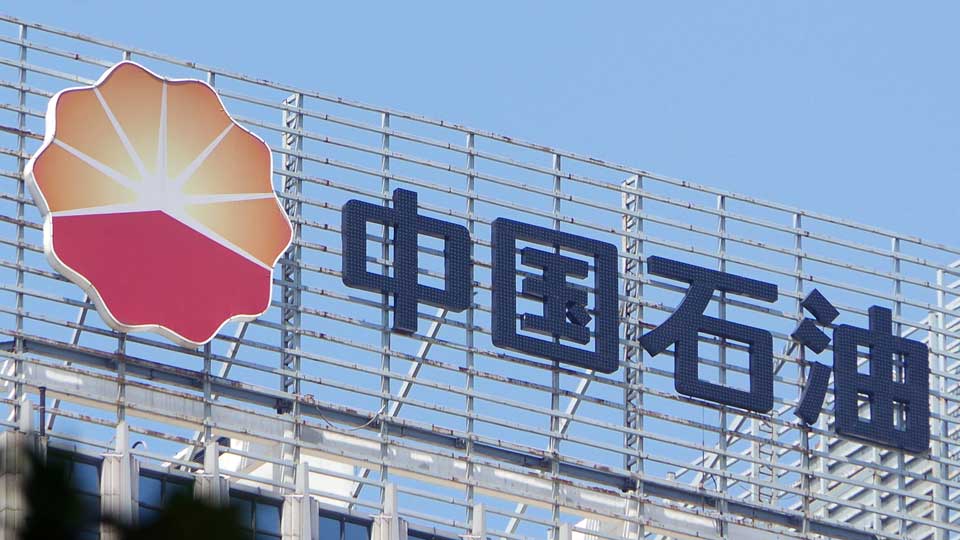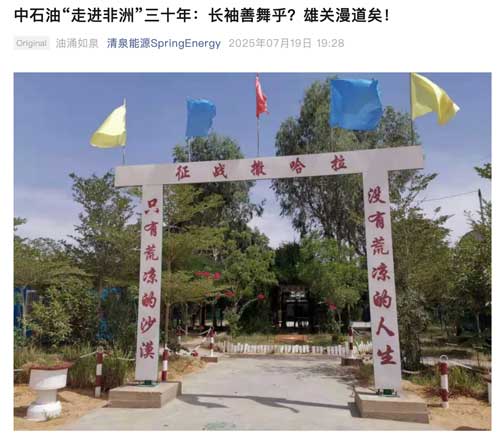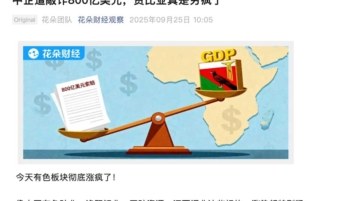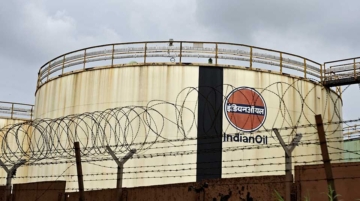

In a rare and revealing essay published under a pseudonym, a veteran PetroChina executive, known among peers as General Lu, offers a sobering account of China’s three-decade energy adventure in Africa. Marking the 30th anniversary of PetroChina’s entry into Sudan in 1995, the article is more than a memoir. Instead, it is a frank review of China’s deepening troubles across the continent and a pointed warning about what lies ahead.
The article guides readers through PetroChina’s dramatic rise in Sudan, from securing oil blocks in 1995 to building two 15-million-ton oil fields and a sprawling industrial chain in record time. At its peak, Sudan became China’s flagship overseas energy success, helping transform PetroChina from a domestic firm into a confident global operator. But those glory days have long since given way to chaos. Civil war, state collapse, and endless regime changes across Africa have since unraveled much of that early promise.
The real significance of the article lies in its diagnosis of five escalating risks now confronting Chinese energy and resource investments in Africa:
Resource Nationalism by Military Regimes:
First, a new generation of African strongmen is using the rhetoric of “resource sovereignty” to extort Chinese firms, such as PetroChina. As global competition for critical minerals—rare earths, uranium, nickel, cobalt, copper—intensifies amid the energy transition and U.S.-China rivalry, some African nations are leveraging their resources for maximum gain.
After the July 26, 2023, military coup in Niger, which ousted the pro-Western president, the new junta expelled foreign troops, seized French-operated uranium mines, and targeted Chinese companies under the banner of “economic independence,” using victimhood narratives to justify violations of established business norms.
- U.S.-China Rivalry Reaching African Soil: Africa’s mineral wealth has become a pressure point in the broader U.S.-China competition. The author notes that Trump’s “minerals-for-security” doctrine has emboldened African leaders to play both sides. In the DRC, for example, Chinese miners face harassment while President Tshisekedi offered the United States access to the DRC’s critical minerals in exchange for security support against rebel groups, including the Rwanda-backed M23.
- Security Vacuum and Armed Violence: Since 2022, repeated coups and the retreat of Western troops have created a power vacuum across the Sahel. Terrorist groups and armed factions now operate freely. PetroChina’s Niger–Benin pipeline has come under constant attack, not only from militants, but from rebel groups allegedly backed by Western powers aiming to destabilize Chinese-aligned governments.
- Geopolitical Disruption by New Players: With the West in retreat, new players are stepping in. Russia’s “Africa Corps” (formerly Wagner) has expanded rapidly through “security-for-minerals” deals. Turkey and the UAE are deploying their own private security contractors. China, bound by its non-interference principle, finds itself boxed out of this emerging model.
- Volatile Legal and Investment Environments: Frequent changes in tax, labor, and localization laws make long-term planning nearly impossible. Chinese firms are being hit with massive fines or forced to surrender equity under vaguely defined legal justifications.
Yet the author does not end with defeatism. He outlines four forward-looking strategies for the next 25 years of China-Africa energy cooperation.
- Sustain and Deepen Existing Oil & Gas Projects: Despite rising challenges, Africa still holds vital reserves. With many contracts due to expire, the next 20–25 years remain a critical window for stable cooperation.
- Shift Toward Critical Minerals with Collective Risk Sharing: As energy transition accelerates, China should lead or co-invest in joint ventures with Western firms for rare earths, cobalt, and lithium in order to share profits and political risk.
- Integrate Renewables into Legacy Projects: Oil and gas ventures should begin embedding wind, solar, and hybrid power models.
- Tackle Energy Poverty as a Joint Mission: China must align its investments with African development priorities and improve energy access for local populations to build resilience against political backlash.
Why is This Important?
This article pulls back the curtain on the political, economic, and human costs of China’s flagship overseas energy experiment. As Africa’s landscape grows more volatile and great power competition intensifies, Beijing’s once-stable foothold is fracturing. Crucially, the author reveals how the escalating China–U.S. battle over critical minerals is destabilizing relationships that once seemed secure—turning resource-rich African states from partners into power brokers. What began as a scramble for cobalt and rare earths is now rippling outward, contaminating long-standing oil, gas, and infrastructure deals, and placing the entire model of China-Africa economic cooperation under new strain.












